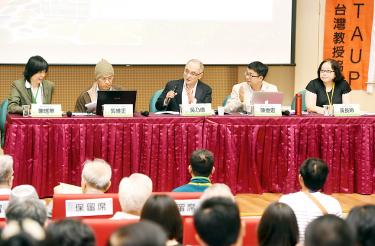At a time when “transitional justice” is on everyone’s lips, Taiwan faces the questions of not only how it should be achieved, but also how “historical truth” should be received, academics said in Taipei yesterday.
In the first day of a two-day Taiwan Association of University Professors symposium titled “Transitional Justice and Law,” academics exchanged views on how transitional justice should be defined and applied.
On a theoretical level, they said that when the definition of transitional justice is over-inclusive, the term becomes meaningless.
“It has to be recognized as a normative concept, with a contextual background in which what needs to be redressed, through certain measures and projects, is systematic or institutional violence and human rights violations perpetrated in the past,” Soochow University philosophy professor Chen Jau-hwa (陳瑤華) said.
“Truth, justice, reparations and guarantees of non-recurrence are four criteria of transitional justice, and the strategies must be holistic — as expounded in a UN report — incorporating integrated attention to individual prosecutions, reparations, truth-seeking, institutional reform, vetting and dismissals, or an appropriately conceived combination thereof,” Huafan University assistant professor of philosophy Kung Wei-cheng (龔維正) said.
While Chen and Kung broadly defined transitional justice as the handling of past institutional violations of human rights, Soochow University political science professor Chen Chun-hung (陳俊宏) said that not every human rights violation should be addressed in the name of transitional justice.
“The mechanisms dealing with transitional justice, such as establishing a truth committee, reparations and institutional reforms, are linked to a particular ‘transitional moment,’ which is why they are different from the standards and operations of ordinary justice,” he said. “I am not saying that past rights violations targeting homosexuals and Aborigines, for instance, are not to be redressed, but what they really need is a standing human rights committee” to deal with a nation’s overall structural injustice.”
On the practical level, Kung said Taiwan has so far only provided financial compensation to people affected by the 228 Incident and the White Terror era, but “the right to reparations should include measures of social and psychological rehabilitation of the victims and should be accompanied by the right to truth and justice,” he said, citing the Review of the Initial Reports of the Government of Taiwan on the Implementation of the International Human Rights Covenants, which was published in 2013.
Impunity is the greatest obstruction to transitional justice, and Article 9 of the National Security Act (國家安全法), which forbids cases tried by military judicial authorities during the Martial Law period being subject to appeal or retrial in a civil court, “amounts to an amnesty for those who committed human rights violations during the White Terror era,” Kung said.
Chinese Culture University professor of law Cheng Wen-chung (鄭文中) said that in the case of government-sponsored crime, ordinary statutes of limitation requirements should not apply, because “the very reason a government exists is to protect its people.”
Forum participants said that prosecution of human rights offenders would be key to any new transitional justice efforts.
“The core of transitional justice is determining who the wrongdoers are, because only then can you begin to point out what actions are right or wrong,” Youth Synergy Taiwan Foundation researcher Lin Long-shen (林雍昇) said, adding that any transitional justice that did not punish wrongdoing would be “hypocritical” and would only have limited effectiveness.
National Chengchi University Graduate Institute of Taiwan History director Hsueh Hua-yuan (薛化元) said that focusing solely on ostensible political cases would not exhaust what needs to be redressed concerning human rights violations during the former Chinese Nationalist Party (KMT) authoritarian regime.
He raised examples of bankruptcy and accusations of embezzlement, which he said were — according to the oral history — contrary to their economic appearances, political in essence and were selectively persecuted or convicted due to the fact that accused companies had upset then-president Chiang Ching-kuo (蔣經國), either by secretly aiding liberal-leaning magazines or attempting to coordinate a nationwide network of local politicians.
Hsueh called into question the redaction of files made possible by regulations governing the privacy of personal information.
However, National Taiwan University associate professor of political science Huang Chang-ling (黃長玲) said that a complete opening of political files carried the risk of turning what should be an operation for justice into a re-perpetration of human rights breaches.
Additional reporting by Abraham Gerber
Source: Taipei Times - 2016/04/24





















